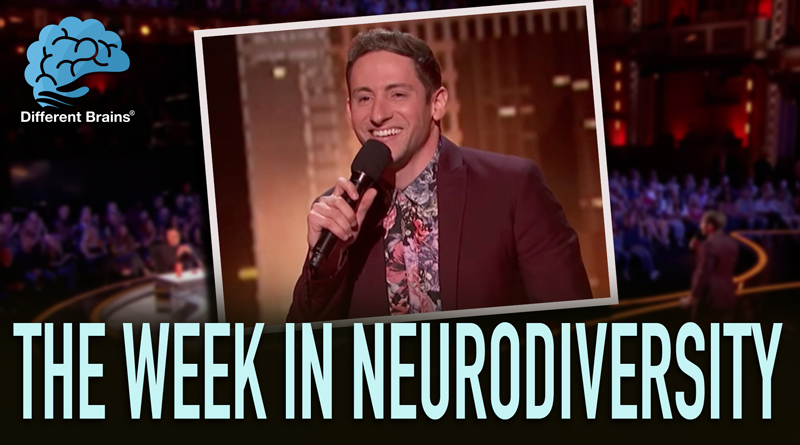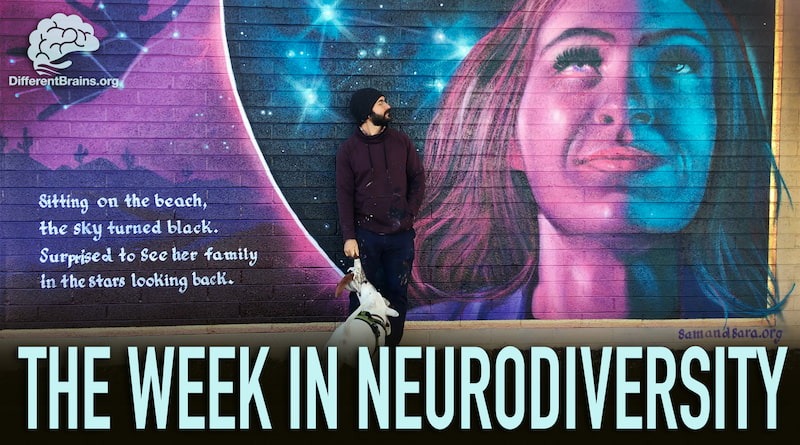Becoming a Neurodiversity Self-Advocate, with Julia Futo | EDB 236

DCD self-advocate and Different Brains intern Julia Futo discusses how she found her voice.
(14 minutes) Julia faced difficulties early on in life with trying to perform everyday tasks. Before she was five years old, she was diagnosed with two learning disabilities: Encephalopathy and Developmental Coordination Disorder (DCD). She struggled in school for a long time, but that changed when she took journalism in high school and learned how to become an advocate. She is currently in college and hopes to help others find their voices.
For Different Brains articles written by Julia click here
To see Julia’s “Neurodiversity and the Coronavirus” project click here
Julia’s article for EP Magazine can be seen here
AUDIO PODCAST VERSION:
Or look for us on your favorite podcast provider:
iTunes | Stitcher | SoundCloud
FULL TRANSCRIPTION
HACKIE REITMAN, M.D. (HR): Hi, I’m Dr. Hackie Reitman. Well start off. Dr. Hackie Reitman, welcome to another episode of Exploring Different Brains. And today, I’m delighted to have with us one of the more interesting people I’ve met in my lifetime, happens to be a trainee intern, self advocate right here with differentbrains.org. She’s going to tell you all about herself. This is Julia Futo. Julia, welcome to Exploring Different Brains.
JULIA FUTO (JF): Thank you, Hackie, it’s an honor to be on here. You know,
HR: I got to tell you your story, even amongst all the unique is unique. So rather than me drag it out to you, I’m just gonna let you tell our audience how you Julia Futo came into this world.
JF: Okay, so my life started with a bang, literally. Um, my mom had a normal pregnancy with me. But my birth was very complicated and very eventful. So I was born blue with a true knot in my umbilical cord that wrapped twice around my neck and caused oxygen deprivation to my brain. To top that off, I had, I think of 31 possible blood tests or blood problems 18. So well over half. And my Apgar score, which measures of baby’s health over the first minute and five minutes of their life, never reached its full potential. And because of how complicated of a birth I had, no one knew if I would even live. So I had to be hospitalized for several days after I was born. Because I lived. My the delivery nurse told my mom that I was a miracle baby and born for a reason. And the oxygen deprivation, later on led to some other things. You know, my grandmother was the first person to notice that there might be something like a little different about me. And she advised my mom to seek professional help for me. And by the age of five, I had two diagnoses.
Now, I’ve had multiple diagnoses over my life. But I think the two most important for this discussion would be encephalopathy, which is brain damage. And the one I want to be talking about today, which is developmental coordination disorder. Because of my disabilities, I had it very hard in school, you know, I was bullied by peers, and even one teacher who told my mom that I was “retarded”. And obviously, that didn’t go very well. And so I struggle a lot in school. But once I reached by last two years of high school, I discovered journalism. And my journalism teacher went on to be one of the most influential people in my life, as well as my ESE facilitator. Because with the help of them, I learned to love journalism. And I became very involved in my school. And I also did an experiment where I would be representing my high school’s ESE program. And I never mind you, I never spoken in front of an audience like that before, so I had no idea what to expect. And it turned out to be success.
So I ended up actually doing a few more speeches before I graduated from high school. And I just didn’t want that to end I didn’t want to stop doing the advocacy because I really found my voice through that and was helping, thought I was influencing a lot of people. And so fast forward a year. So I’m one of my friends whose mutual friends with Anita Mitchell, who is one of our board members, got me involved with different brains. And here I am today, at a part of the team and so proud of many of the things I’ve been able to accomplish, as well as being so honored to have met all the wonderful people that I have been, it’s really a pleasure to be part of the team.
HR: Tell us about your career goals and how they mesh with your internship here at different brains.
JF: So I have a few different career paths that I have in mind. One is journalism, because it’s a way to do advocacy and to really help other people as well spread awareness. And that is not kind of but actually what I am doing right now I’m different brains, interviewing people about you know, it’s COVID right now. COVID time. Interviewing neurodiverse people or those affiliated with that about their experiences with trying to adapt to the Coronavirus and given them the opportunity to do some advocacy by offering advice to those that are having difficulties dealing with it. Other things are because of, I think, because I’ve been brought up, and all, not necessarily things that are wrong with me. But the quirks that I have, I’m very interested in psychology and health. Also, due to the experiences I’ve had with school education as well, I have so many different visions of what I want to do. And it’s hard to narrow down to just one.
HR: Well, it’s great to have visions, and it’s great to have lofty goals, and it’s great to go after. And I know you work hard. I mean, one of the impressive things about you to me is you’re doing all this work at different brains at the same time you’re holding down a job at the same time you go into college, at the same time you helping your mom, you know, that’s a full plate with a big activity roster, which is gets me into the next question, I think one of the best tools we can all have is to have a full dance card, so to speak with plenty to do, why don’t you give our audience some of the tools that have helped you along the way that you might share with others to encourage them.
JF: Okay, so to become an advocate, um, a lot of people are advocates, they never have an easy life. So you have to go through some experiences. But if you’re a neurodiverse person, such as myself, the first step to becoming an advocate is self acceptance. You realize that you have these things about you. And a lot of people, you know, they think that something is wrong with me. But it’s all about mindset. And sometimes it’s actually reassuring for somebody to hear they have this because then they realize they’re like that way for a reason. So once you learn to kind of cope with what neurodiversity or neurodiversities you may have and learn to love yourself and build up that confidence. You’re, you’re on a good track. Second, you need to find what you’re passionate about. Because once you find a passion, then you’re almost unstoppable. So find something in my case, it was journalism as one of them and find a platform and how you can do what you love. And you might need a little bit of help along the way. But never feel ashamed to ask for help. Because if you don’t, if you’re not getting help, but at the same time, you don’t ask for it, you might never get that help. And any resource you can get take advantage of it. So once you’ve found that resource or on that platform, then you can start to develop your voice. And then you can take on the world and do whatever you’re most passionate about and help as many people as you want. And there’s many people that need help.
Now, two. Now, if you’re a person that’s kind of an a juggling act, whether you have many classes that you have to handle, or have a job in addition to the classes, or try to balance out family time or social life. That can be kind of tricky, but um, it definitely helps to have a planner or to have a backup plan. Now granted, things don’t always go your way. And sometimes a spontaneous change happens. So if something spontaneous happens, and you can’t get done with all the things that you want to do, it’s important to not be hard on yourself, because then there’s that negative mentality. And I’m a big believer in what you think you manifest. So if you think negative negatively, then you’ll manifest negatively. So do what you can and celebrate each and every one of your tiny accomplishments. But appropriately so for example, if your goal is to lose weight and you want to celebrate, don’t eat a whole bunch of junk food, so celebrate appropriately. Any small victory have.
HR: Very well said you know, life is a balancing act and you’ve done so well. balancing your work your play your socialization, your self advocacy in so many other activities, all wrapped into one. Where do you see yourself five years from now?
JF: It’s hard to say but within the next five years, I’m, I’m hoping to be at least most of the what the way done with education, hopefully five years, well, yes, hopefully five years from now, the whole COVID, fiasco will come to an end, and I can get back to work, and start earning some money to help pay for things or to gain more independence, as well. Um, there are many projects I’d like to do in the future, such as publish more things for Different Brains, and maybe even do my own research project on how education in America is, and what can we do to improve education, as well as write my own book on… Well, two books about my condition, developmental coordination for also called DCD, one would be more so a research type of brand that will be with Different Brains, and won’t be my own independent life story, and how my experiences have helped shape me into the person that I am today, as well as how other people can recognize developmental coordination disorder. And well, not even just that, but help anyone that has a different mindset and a different way of thinking.
HR: You were recently published in the very respected publication, exceptional parent magazine, in the editor, Rick Rader, who’s one of my heroes, with the AADMD and so many other things he does was exceptionally complimentary to you. He said things that were so nice about you that he’s never said about me. And afterwards, I said to him, I said, “Hey, Rick, I said, you said that, that, you know, Julia is brilliant, you never said I was brilliant”. He said, “That’s because you’re not”.
JF: We’re all smart in our own ways.
HR: That’s the point. We’re all smart in our own ways. And you are the world’s authority on your unique perspective. As we each are doesn’t mean we’re the world’s authority, in an encyclopedic sense about any topic except for the topic of our perspective, how we see things and everything. And I’ve watched you speak in public. And when you start off with the first sentence is always a grabber. When you say from my very first breath…
JF: Exactly, need to lure the audience in that’s how you also, it’s, there’s an art to it. If you want to be a good public speaker, you need to be creative, like, how can I lure audiences in? How can I get them to want to know more about what I’m trying to fight for and what they can do to fight for it?
HR: Well Julia Futo on that note, I’m gonna thank you for educating all of us on developmental coordination disorder, which I personally knew very little about, even though I’m an orthopedic surgeon,
JF: Well that’s different, that fall under the category of neurologists in physical therapy not an orthopedic surgeon.
HR: Right. And thank you for educating us in writing the articles you’ve written for different brains and doing our webisode series in doing this interview. So I look forward to you developing your books, and your further journalistic efforts. And it’s great to have you on board at Different Brains. Thank you for all you do.
JF: Well, thank you for having me, because different brands has done a lot for me, too. It’s really given me a platform to continue my advocacy after I graduated from high school, which is what exactly what I’ve been wanting to do.
HR: That’s great. Keep up the great work. And we’ll have you back again soon. Thank you very much.
JF: Thank you. It’s been a pleasure.




